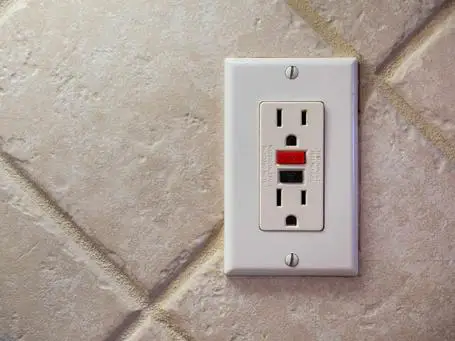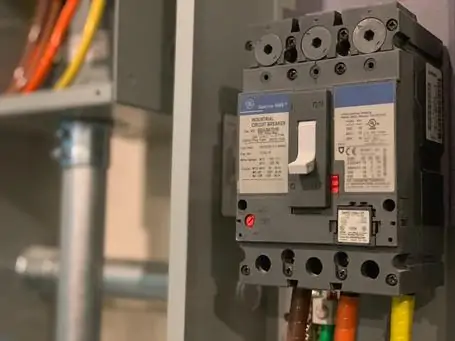Does a refrigerator need a GFCI? If you have a regular electrical outlet, you can use a GFCI to power a refrigerator. Despite what some say, a non-GFCI outlet may not be the greatest option for people who want to keep meats and veggies.
Take a peek at what occurs when a refrigerator is plugged into a ground-fault circuit interrupter outlet (GFCI).
Does A Refrigerator Need A GFCI?
Both a normal outlet and a GFCI can power your refrigerator. Many people believe that using a non-GFCI outlet for storing food is the best solution. This is done in the belief that it will prevent the circuit breaker from tripping and causing food to deteriorate.
While your refrigerator may trip the GFCI outlet repeatedly, this is often not the fault of the GFCI but something with the refrigerator.
In a household context, a GFCI circuit is not required, but it is strongly recommended because it is safer, especially because your refrigerator is in the kitchen. Bypassing the GFCI circuit can result in an electric shock if it senses an imbalance in the current.
GFCIs and dedicated circuits, even if not mandated by law, can assist reduce the risk of electric shock. In addition, it will reduce the risk of your food rotting due to a tripped circuit.
Interesting Read: Does Refrigerator Need Special Outlet?
How Does A GFCI Outlet Work In A Refrigerator?
A GFCI outlet is a type of electrical outlet that is designed to protect against electrical shocks. It does this by sensing when there is an imbalance between the hot and neutral wires in the outlet, and then it trips the circuit breaker.
This prevents the flow of electricity and protects the user from being electrocuted. GFCI outlets are required by code in many areas, and they are a good idea to have in any home where there is potential for electrical shocks. In a refrigerator, a GFCI outlet can be beneficial because it can help to prevent accidental shocks from occurring.
If the fridge is plugged into a standard outlet, someone can reach in and touch the bare wires, resulting in an electrical shock. However, if the fridge is plugged into a GFCI outlet, the outlet will sense the imbalance and trip the circuit breaker before anyone can be harmed. GFCI outlets are not only beneficial in preventing accidental shocks; they can also help to protect against electrical fires.
If an appliance or other device is overloaded, it can cause a fire. However, if there is a GFCI outlet installed, it will sense the overload and trip the circuit breaker before a fire can start. This makes GFCI outlets an important safety feature in any home.
While GFCI outlets are not required by law in every area, they are a good idea to have in any home where there is potential for electrical shocks. In a refrigerator, a GFCI outlet can help to prevent accidental shocks and fires. If you are unsure whether or not your home has GFCI outlets, you can contact an electrician to have them installed.
Importance Of Running a Refrigerator on GFCI
A refrigerator is one of the most important appliances in a home. Not only does it keep food fresh, but it also helps to prevent the growth of bacteria and mold. However, refrigerators can also be a source of electrical hazards.
One way to help reduce the risk of electrical shocks is to run the refrigerator on a ground fault circuit interrupter (GFCI). GFCIs are devices that protect against electrical shocks by quickly shutting off power when they detect a change in current. This can be especially important in areas where there is a lot of moisture, such as near sinks and bathtubs.
In addition, GFCIs can help to protect against fires caused by faulty electrical wiring. As a result, running a refrigerator on a GFCI is an important safety precaution.
Best Places To Put GFCI Outlet
GFCI (Ground Fault Circuit Interrupter) outlets are a vital part of any home’s electrical system. They are designed to protect people from electrical shocks by quickly shutting off power to an outlet when they detect a ground fault.
While GFCI outlets can be placed anywhere in a home, some locations are better than others. The kitchen is one of the best places to put a GFCI outlet. Kitchen appliances often have Wet Hands.
Meddling fingers searching for lost contact behind the range or refrigerator. Outlets near water sources like sinks and dishwashers should be equipped with GFCIs. Another good location for a GFCI outlet is the bathroom.
Like the kitchen, bathrooms contain many potential sources of water, making them ideal places to use GFCIs. Garages and workrooms are also good locations for GFCI outlets, as they often contain power tools and other equipment that can pose a shock hazard. By placing GFCI outlets in these key locations, you can help to keep your family safe from electrical shocks.
Conclusion
Ultimately, it is up to the homeowner to decide whether or not to install GFCIs. However, they are a wise investment and can help to protect against electrical shocks and fires. If you are uncertain about whether or not your home has GFCIs, you can contact an electrician to have them installed. This can give you peace of mind knowing that your home is safer from electrical hazards.
Frequently Asked Questions
Does Your Refrigerator Need AFCI
The answer is maybe. An AFCI, or arc-fault circuit interrupter, is a device that helps to prevent electrical fires. It does this by sensing Dangerous arcs of electricity and then breaking the circuit to prevent the fire from starting. While this may sound like something that you would want in all of your appliances, not all appliances need an AFCI.
In general, only appliances that use a lot of electricity and generate sufficient heat to start a fire, such as a stove or a dryer, need an AFCI. However, some newer model refrigerators also come with an AFCI, so it is important to check your owner’s manual to see if yours does.
Even if your refrigerator does not come with an AFCI, you may still be able to install one yourself. However, it is always best to consult with an electrician before attempting any type of electrical work.
Do Refrigerators Need An AVR
There are a few things to consider when answering this question. The first is the type of refrigerator you have. If you have a top-freezer refrigerator, the answer is likely no, as these models typically do not require an AVR. However, if you have a bottom freezer or a side-by-side refrigerator, the answer is less clear.
These models can benefit from an AVR, as it can help to regulate temperature range and prevent freezing. However, whether or not you need an Avr will ultimately depend on your specific model and how well it functions without one.
Ultimately, the best way to determine if your refrigerator needs an AVR is to consult your owner’s manual or contact a qualified repair person. They will be able to help you troubleshoot the issue and determine the best course of action.


